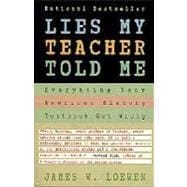
Note: Supplemental materials are not guaranteed with Rental or Used book purchases.
Purchase Benefits
What is included with this book?
James W. Loewen is professor of sociology at the University of Vermont. He is coauthor of the first integrated state-history textbook, Mississippi: Conflict and Change, and creator of The Truth About Columbus: A Subversively True Poster Book for a Dubiously Celebratory Occasion.
| Acknowledgments | 9 | (2) | |||
| Introduction: Something Has Gone Very Wrong | 11 | (7) | |||
|
18 | (19) | |||
|
37 | (38) | |||
|
75 | (23) | |||
|
98 | (39) | |||
|
137 | (34) | |||
|
171 | (29) | |||
|
200 | (14) | |||
|
214 | (24) | |||
|
238 | (16) | |||
|
254 | (17) | |||
|
271 | (27) | |||
|
298 | (14) | |||
| Afterword: The Future Lies Ahead--and What to Do about Them | 312 | (7) | |||
| Notes | 319 | (57) | |||
| Appendix | 376 | (1) | |||
| Index | 377 |
The New copy of this book will include any supplemental materials advertised. Please check the title of the book to determine if it should include any access cards, study guides, lab manuals, CDs, etc.
The Used, Rental and eBook copies of this book are not guaranteed to include any supplemental materials. Typically, only the book itself is included. This is true even if the title states it includes any access cards, study guides, lab manuals, CDs, etc.